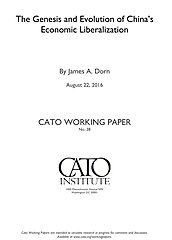China has made much progress since it first opened to the outside world in 1978 under the guidance of paramount leader Deng Xiaoping. The devastation caused by Mao Zedong during the Great Leap Forward (1958–60), the Great Famine (1959–61), and the Cultural Revolution (1966–76) led Deng to rethink Marxist ideology and central planning. Rather than adhering to Chairman Mao’s “Little Red Book” and engaging in class struggle, Deng elevated economic development to the primary goal of socialism. His vision of “market socialism with Chinese characteristics” — and his mantra, “Seek truth from facts” — paved the way for the emergence of the nonstate sector and the return of private entrepreneurs. The success of that vision is evident from the fact that China is now the world’s largest trading nation and the second largest economy.
This article tells the story of how China’s pro-market reforms were initiated and continued despite many bumps in the road. What is striking is that many of the reforms began at the local level and were motivated by the desire for greater economic freedom. Entrenched interests opposed departing from state-led development under the plan, but courageous individuals were willing to experiment with market alternatives to increase their freedom and prosperity.
The bottom-up reform movement eventually led to the creation of a vibrant market economy sanctioned by the state. It would be misleading, however, to think that China has established a genuine free-market economy. Such a change would require limited government, widespread private property rights enforced by an independent judiciary, and the safeguarding of basic human rights.
There is still no free market for ideas, and state planning is far from dead. The Chinese Communist Party (CCP) continues to hold a monopoly on power and to thwart criticism. President Xi Jinping made it clear in his remarks at the party’s 95th anniversary (July 1, 2016) that Marxism, not liberalism, is the bedrock of China’s political regime: “Turning our backs or abandoning Marxism means that our party would lose its soul and direction” (Wong 2016).
Initially the goal of China’s reform movement was to improve the performance of state-owned enterprises (SOEs). However, the nonstate sector, including private enterprises, became the engine for creating new wealth and employment as constraints on entrepreneurship and trade were gradually relaxed. But even before they were relaxed, brave individuals were willing to violate the law by engaging in private enterprise.
This article begins with the state of China’s economic and social life under Mao and proceeds to examine the genesis of economic reform that took place between Mao’s death in September 1976 and the Third Plenum of the Eleventh Central Committee of the CCP in December 1978, which is considered the official start of Deng’s economic liberalization. We then investigate the unfolding of reforms from 1978 to the present, what motivated those reforms, and the prospect for future reform. The focal point will be the quest for economic freedom and the relation between the state and the market in the process of development.

